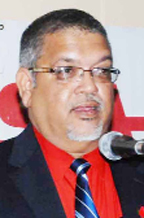A prominent city businessman has told Stabroek Business that he believes the local private sector umbrella bodies ought to be doing more “to publicly highlight the challenges that are affecting the efficiency of the private sector” while “doing as much as they can to work with the government to respond to those problems”.

The businessman, who has interests in the commodity importation sector, told this publication that while he agreed with Private Sector Commission (PSC) Chairman Ramesh Dookhoo that the sector ought not to be “in permanent conflict” with government, he believed the local umbrella organisation was “far too cautious” in speaking its mind about “issues that are having a negative impact on business” in Guyana. Mr Dookhoo is right. We are not at war with the government but we need to let them know about the issues that are bothering us and how we believe they can address those issues.”
Asked about the concerns he would wish to see highlighted more by the PSC, the businessman said the issues were “obvious”. He alluded to what he described as “the slow pace” of talks between government and the private sector on the issue of tax reform though he conceded that was one of several issues which the business community hoped would be settled with the framework of the National Competitiveness Strategy. “If you can get most businessmen to tell you the truth they will probably say they would wish to see the National Competitiveness Strategy moving more quickly,” the businessman said.
Asked about the recent assertion by Dookhoo that the private sector was not afraid of government, the businessman said while he did not believe “fear is the issue, local private sector bodies have tended to exercise extreme caution” in making public statements which they believe might have a bearing on their relationships with government. “We cannot deny that the PSC exercises a great deal of caution, too much caution in what it says publicly,” the businessman said.
According to the businessman there were other “major issues” which had come to the fore and which the PSC appeared to be reluctant to make a public pronouncement on. “One of those issues is this whole question of illegal imports and the role that this is playing in affecting the returns of the local beer and beverage industry.”
“If I am not mistaken the Chairman of Banks DIH Ltd has talked about this matter over and over at the company’s shareholders’ meetings but we have heard nothing from the PSC about how government ought to be treating with smuggling. Mind you, I am not saying that this is an easy matter to deal with. What I am saying is that we need to know that it is on the PSC’s agenda and the only way we can know this is if they say so publicly.”
The businessman also told Stabroek Business that while it appeared that consumers are now being affected by another “blackout season” there has been no pronouncement up until now from the PSC. “Look at the difference in Jamaica where your own paper has been reporting what the business people there have been saying about how electricity problems have been affecting production,” the businessman said.
On June 23, Stabroek News ran a story reprinted from the Jamaica Observer which quoted William Mahfood, Head of Winsynco, a Jamaican beverage manufacturer, as saying that the high cost of energy and inefficiencies in power delivery are having the greatest impact on production in the country. Mahfood, according to the Observer article, said that his own company had lost 60 hours of production in 2009 as a result of problems associated with poor power delivery and had been forced to invest US$1 million in a standby plant. “This is ridiculous for a manufacturer to take money that could be used to increase its capacity to put into a standby unit for lost time,” Mahfood was quoted as saying. Crime and high interest rates were also cited as being among the major concerns of Jamaica’s business sector.
“If you read that report on Jamaica you will find that some of the problems affecting business there are the same as those in Guyana. The difference there is that businessmen are speaking out openly about these problems.
It is the only way that they can bring their concerns to the attention of the people and the government. And yet I would not say that they are in any kind of war or conflict with the government,” the businessman said.
And according to the businessman he had noted that the PSC had “justifiably” given credit to the government for the passage of the Fiscal Enactment (Amendment) Bill which has opened the door for lending institutions to provide financing for small and micro businesses. “Of course the private sector must give credit in cases where things are done to help the growth of the business community and in this case small business. What I am saying is that, equally, when there are things to be said about matters that bother businessmen or difficulties that need to be addressed we must say those things too. I do not agree with those who say that if the private sector speaks its mind in the media it is negotiating with the government in a public manner.”




